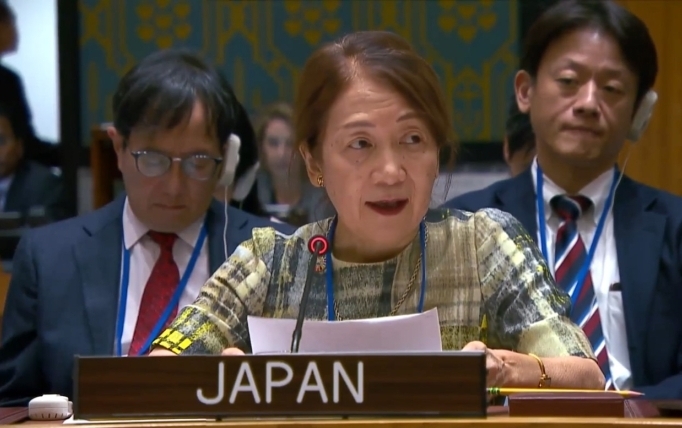Statement by H.E. Ambassador KAJI Misako, Ambassador for Science and Technology Cooperation, at the Security Council High-Level Briefing on "Maintenance of international peace and security: Anticipating the impact of scientific developments on international peace and security”
2024/10/21

(As delivered)
Merci, Monsieur le Président.
I thank you for convening this timely and important meeting.
Advances in science and technology, as eloquently described by the briefers today including in the case of neuroscience and of frontline war zone experience, are proving to be transformative for all human activities including diplomacy. As for neuroscience, Japan for instance funds moonshot projects to foster Cybernetic Avatars aiming for 2050. Japan fully appreciates your initiative in bringing science to this Council with a vision towards the future and the effective use of scientific methodologies in the Council’s work.
Mr. President,
New and emerging technologies are playing an increasingly important role in national and international security. At the same time, distinguishing between civilian and security-related uses of these cutting-edge technologies has become complicated than ever, and they keep advancing at top speed. It has become all the more important to address these challenges and form a safe environment for innovation, including through regulations and collaboration. This Council should be mindful of current undertakings in various fora within and outside the UN when considering this agenda.
Japan was one of the earliest co-sponsors of the UN General Assembly resolution adopted last March that focused on using AI to attain the SDGs. Here we are reminded that the three pillars of the UN are intertwined in many ways.
Mr. President,
This Council should be cognizant of technological tools when authorizing peace operations. Safety and security of UN personnel, both civilian and in uniform, is a prerequisite for efficient and effective operations. For example, access to specialized medical services in the field is often limited, casualties of peacekeepers record high having exceeded 100 a year at times. Telemedicine utilizes digital communication technology to connect missions with different levels of medical facilities and provide timely and high-quality medical care to peacekeepers. Japan supports this project under the UN Triangular Partnership Programme, in collaboration with the troop contributing countries.
Mr. President,
The world must join forces to support innovation while properly mitigating the risks and misuse of emerging technologies. Japan has led the international discussion on the governance of advanced AI systems to achieve safe, secure, and trustworthy AI including through the Hiroshima AI Process. Launched in May 2023, this process led to the development of the International Guiding Principles and the Code of Conduct, on which more than 50 countries in its Friends Group are now working to address the risks of generative AI.
Mr. President,
The international community has been facing multiple crises as climate change and pandemic, which can be root causes of serious agendas in this Council. Science and technology could serve as the means and the catalyst for states to unite and meet these common challenges and the Council is well placed for this. Emerging technologies should be developed and used responsibly to prevent conflicts ensuring rule of law, human dignity and human security.
Last month, the Pact for the Future was adopted, with a chapter on science and technology. Japan intends to build on this momentum and continue participating proactively to strengthen the functions of the United Nations, including by enhancing the effectiveness of Security Council actions that leverage science and technology.
I thank you.
